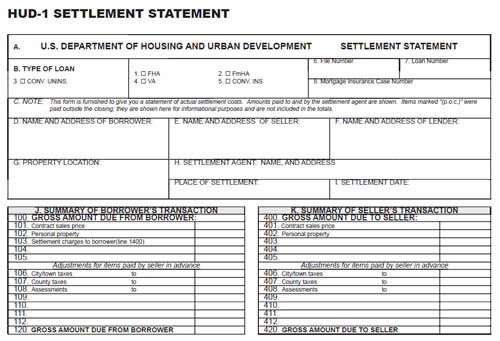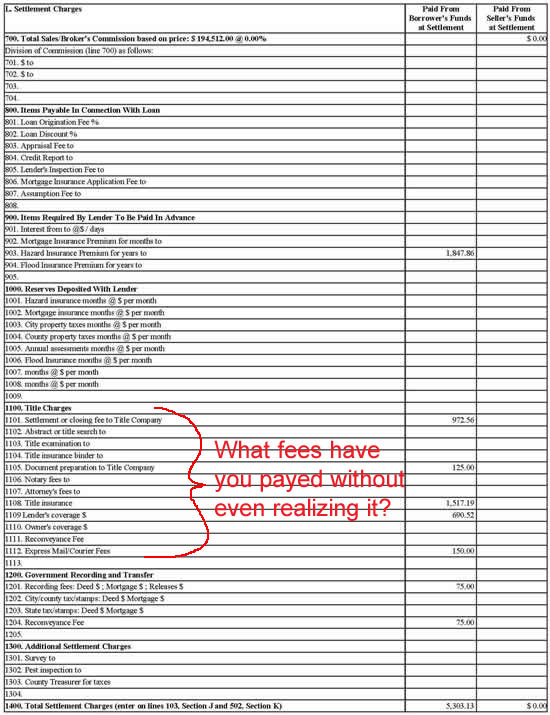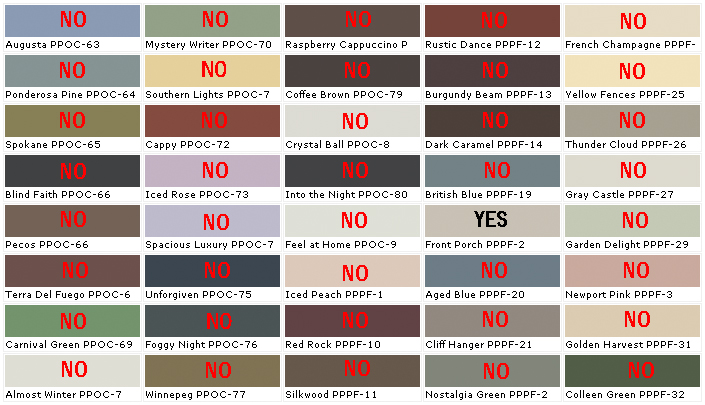Real Estate Archive
You Paid WHAT at your Closing? Time to Check your HUD-1 Form…
March 5th, 2013. By AbiK
We’ve had a number of people ask us about real estate fees this week after our story entitled “Illegal California Real Estate Fees Costing Consumers” posted. One of the biggest questions everyone has is this: How do you know—or where do you find out—if you’ve either paid too much in real estate fees, or worse, have been charged a fee illegally?
Anyone who’s bought a home knows that last day—the day when everything is finalized and you get the keys to your new home—is a day fraught with both excitement and the overwhelming sense that you’re signing your life away. If you were completely lucid for even one small moment, you might remember that you signed a form that looked like this—it’s the HUD-1 Settlement Statement that every home buyer signs at the closing:
Unfortunately, while in the throes of signing all the paperwork, who has time to really read every line item? And that’s what’s at the heart of some recent real estate fee investigations in California—some attorneys are investigating potentially illegal real estate fees that homeowners may have paid—without even realizing it—at their closing.
How do you know if you paid any illegal closing costs? Well, it’s best to have an attorney look at your HUD-1 form—you probably have that along with your title and any mortgage documents. But the first place to look on the HUD-1 if you have it, is on page 2 (see image below), under the section called “Title Charges”. Some of the real estate fee investigations have been focusing on things like exorbitant messenger fees. The HUD-1 will also show whether your homeowner’s insurance company is charging more than it is allowed to charge by law.
So, particularly if you bought a home in California, take a look at your HUD-1 form—and if you find anything that you don’t understand or think is questionable, reach out to a California consumer fraud attorney.
Rally Against Las Vegas HOA Bully Boards Will Only Grow
February 14th, 2011. By AbiK
Thinking of Martha Stewart Gustavian Blue for your home’s exterior reno? Think again. Like that stamped cement driveway you saw on your trip to the northeast? Forget it. Husband travelling and you’re left to ensure the trash cans are tucked out of sight—pronto!—after the garbage truck sweeps by? Get moving. And don’t let me see those kids using sidewalk chalk out front!
Such is the life, apparently, of many a homeowner living within the confines, constraints and—some would say—convoluted constructs of an HOA, or homeowners’ association.
Used to be some odd symbol of “belonging”—or for some, status—to be a part of an HOA (no trailer trash here!) neighborhood. What with all the cookie cutter neatness, lack of individuality and security gates, it’s the facade of a picture perfect community. And a mere facade it’s seemingly become for some folks in Nevada—with a rather ugly behind-the-scenes picture.
An article in the Las Vegas Review-Journal shares what basically boils down to a case of schoolyard bullying—only the playground is now the development, and the bullies are the HOA boards. Those who feel they’ve been bullied (e.g., one homeowner was unjustly fined for the transgression of erecting a fence for which the HOA had previously approved the plans) have now joined voices, if not forces, to rally last Monday against HOA “bully boards”. They’re mad as hell and they want the folks in Carson City to do something about it.
According to the Review-Journal, the rallying homeowners are looking for legislators to, “introduce laws that would cap the amount of HOA fines and collection agency fees, eliminate “kangaroo courts” run by homeowners association boards and limit the mandatory arbitration requirement.”
At issue is Nevada Revised Statute 116—the state law that governs HOA boards. Rally organizer, Jonathan Friedrich, says in the Review-Journal article that 85 percent of decisions in mandatory arbitration go against the homeowner—which obviously brings into question exactly how these decisions are being made.
Friedrich has gone as far as to set up a grassroots website, www.hoa1234.com, to get the word out on the lack of transparency—and honesty—he and his rally mates see in how HOA boards apply rules and penalties. And it goes beyond just current Nevada homeowners—Friedrich and others are quick to point out that HOA bully boards do not exactly serve as an advertisement for prospective home buyers to want to lay down roots in Nevada. Friedrich even notes in the Review-Journal, “It’s interesting that on the MLS (Multiple Listing Service), Realtors are advertising, ‘No HOA.’ What does that tell you?”
We’ll continue to keep an eye on this story as Nevada may just turn out to be ground zero for upcoming HOA-related litigation, and hopefully, change for the better.
Archive by Category
- Accidents (24)
- Airlines (9)
- Asbestos Mesothelioma (262)
- Automotive (25)
- Celebrity (14)
- Class Action (84)
- Complaints/Comments (15)
- Consumer Fraud (84)
- Contest (2)
- Court of Public Opinion (5)
- Crazy Sh*t Lawyers See (61)
- Criminal Law (4)
- Defective Products (111)
- DePuy ASR Hip Recall (2)
- Discrimination (22)
- Drugs/Medical (248)
- Elder Care Abuse (4)
- Emerging Issues (462)
- Employment (54)
- Environment (52)
- Financial (28)
- Food Illness (15)
- Human/Civil Rights (4)
- Insecurities (5)
- Insurance (16)
- Intellectual Property (16)
- Internet/E-commerce (19)
- lawsuits (161)
- Lawyers (20)
- Lawyers Giving Back (43)
- Lex Levity (10)
- Personal Injury (106)
- Pleading Ignorance (53)
- Real Estate (2)
- Recall (6)
- Scam (3)
- Securities (13)
- Settlement (81)
- Tort Reform (2)
- Totally Tortelicious (81)
- Veterans (11)
- Whistleblower (9)


